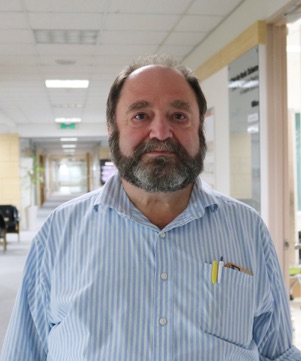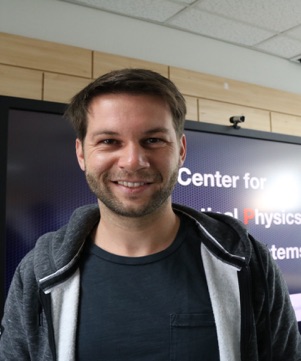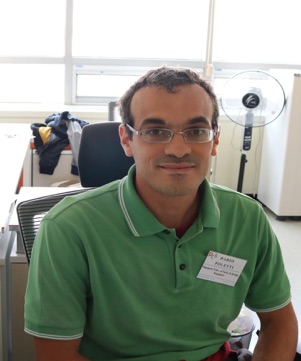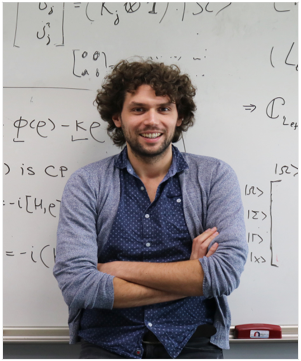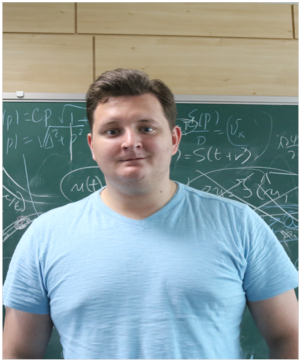





(University of Augsburg, Germany
& N.I.Lobachevsky State University of Nizhny Novgorod, Russia)
at PCS: Feb. 9 - Feb. 28, 2017
Aug. 7 - 31, 2017
Oct. 5 - 31, 2017
Sergey Denisov
My research interests built up in the chronological order. By training, I am a classical physicist with a specialization in dissipative chaos (my Ph.D. thesis is on the strange attractors). When doing my first post-doc at Tel Aviv University, I started to work on the super-diffusion and so-called Levy walks, trying to relate the latter to the dynamics of complex systems. The results of my work in this direction are summarized in a recent review [1].
Then, after I moved to the MPIPKS (Dresden, Germany), I started to work on the so-called “Hamiltonian ratchet effect” (controllable transport in complex non-equilibrium system with broken space-time symmetries at the coherent limit) and its implementation for cold and ultra-cold atoms and optical potentials. This brought me into a close collaboration with experimentalists, which culminated in a series of experiments. The results of my work in this direction are summarized in a review [2].
Finally, I drifted to the quantum sea and started to think about the open quantum systems far from equilibrium [3]. The Big Q which has occupied my mind for the last two years is "Can we construct a theory of dissipative quantum chaos in the way it was done for Hamiltonian chaos?". Now, if you read this description from the very beginning, you would see that I made a loop (it is therefore a personal realization of the Eternal Return). This is also the key reason to initialize this ASG.
[1] V. Zaburdaev, S. Denisov, and J. Klafter, Rev. Mod. Phys. 87, 483 (2015).
[2] S. Denisov, S. Flach, and P. Hanggi, Phys. Rep. 538, 77 (2014).
[3] T. Shirai, J. Thingna, T. Mori, S. Denisov, P. Hanggi, S. Miyashita, New J. Phys. 18, 053008 (2016); M. Hartmann, D. Poletti, M. Ivanchenko, S. Denisov, P. Hanggi, New J. Phys., in press (2017).
(Columbia University, USA)
at PCS: Oct. 20 - 28, 2017
Boris Altshuler
My scientific interests are mostly in the field of quantum theory of condensed matter physics. For a long while I worked to improve the theoretical understanding of the effects of disorder and interactions between electrons on the properties of bulk and low-dimensional and finite-size conductors. Although a number of physical phenomena were predicted and understood as an interplay between the interaction of quantum particles with an external potential and with one another, there is still a lot to understand theoretically. We still have to substantially improve our description of the destruction of the phase coherence in disordered conductors by electron-electron interactions and the effects of disorder on strongly correlated electronic systems. Recently I have been working on the theory of nonequilibrium and metastable states of quantum systems. From a more general perspective I am interested in the fields that are connected with the interaction and disorder in quantum systems: quantum chaos, nanoscience, quantum field theory, and quantum information.
(University of Cologne, Germany)
at PCS: Oct. 22 - 28, 2017
Sebastian Diehl
(MPIPKS, Germany)
at PCS: Feb. 14 - 21, 2017
Oct. 17 - 27, 2017
While a great share of my work is devoted to the far-from equilibrium dynamics of isolated many-body systems (such as atomic quantum gases), with a strong focus on interacting Floquet systems [1], it is my recent interest in the driven-dissipative many-body quantum systems that triggered my participation in the advanced study group "Dissipative Quantum Chaos". In the latter field, I have worked on the question whether a periodically driven Bose gas, where the notion of the ground state does not exist, can form a Bose condensate in the quantum degenerate large-density limit [2, 3]. (The answer is yes, in a generalized form, where an odd number of "Bose selected" states acquire large occupations.) Other work of mine concerns the demarcation between lasing and Bosecondensation in photonic systems and the minimal requirements for thelatter [4], as well as the possibility to induce Bose condensation byemploying two competing baths of different temperatures, both lying wellabove the equilibrium condensation temperature [5]. In Daejeon, I am working on Floquet engineering in open quantum systems.
[1] A. Eckardt, Rev. Mod. Phys. 89, 011004 (2017)
<http://journals.aps.org/rmp/abstract/10.1103/RevModPhys.89.011004>.
[2] D. Vorberg, W. Wustmann, R. Ketzmerick, A. Eckardt, Phys. Rev. Lett. 111, 240405 (2013) <http://link.aps.org/doi/10.1103/PhysRevLett.111.240405>.
[3] Vorberg, W. Wustmann, H. Schomerus, R. Ketzmerick, A. Eckardt, Phys. Rev. E 92, 062119 (2015)
<http://journals.aps.org/pre/abstract/10.1103/PhysRevE.92.062119>.
André Eckardt
(N.I.Lobachevsky State University of Nizhny Novgorod, Russia)
at PCS: Feb. 18 - Mar. 1, 2017
Aug. 7 - 19, 2017
Oct. 22 - 29, 2017
Mikhail Ivanchenko
My research interests lie in the broad area of nonlinear dynamics, complex systems and collective phenomena, including the applications to physics and biology.
One of my main areas is the theory of localization, in particular investigating the interplay between the disorder, interactions, periodic modulation and dissipation. We found and studied the interaction-induced delocalization of two-particle states in quasi periodic potentials, and quantum chaotic subdiffusion in disordered Anderson lattices [1,2]. We shed some light on the modulation-induced interaction of states across an effective mobility edge that appears in correlated disordered potentials and their spatial properties [3]. The other stretch are Anderson attractors/asymptotic states in classical nonlinear dissipative and open quantum systems [4,5]. We also develop the theory of quantum attractors and bifurcations to them, exploring connections to such classical counterparts as pitchfork and saddle-node bifurcations along with the periodic-doubling route to chaos [6,7].
[1] S. Flach, M.V. Ivanchenko, R. Khomeriki, EPL, v. 98, p. 66002, 2012.
[2] M.V. Ivanchenko, T.V. Laptyeva, S. Flach, Phys. Rev. B, v. 89, 060301(R), 2014.
[3] O.S. Vershinina, E.A. Kozinov, T.V. Laptyeva, S.V. Denisov and M.V. Ivanchenko, EPL, 118, 47004, 2017.
[4] T.V. Laptyeva, A.A. Tikhomirov, O.I. Kanakov and M.V. Ivanchenko, Sci. Rep. 5, 13263, 2015.
[5] I. Yusipov, T. Laptyeva, S. Denisov, and M. Ivanchenko, Phys. Rev. Lett., 118, 070402, 2017.
[6] M. Hartmann, D. Poletti, M. Ivanchenko, S. Denisov, P. Hanggi, New Journal of Physics, vol. 19, 2017.
[7] M.V. Ivanchenko, E.A. Kozinov, V.D. Volokitin, A.V. Linisv, I.B. Meyerov, S.V. Denisov, Annalen der Physik, 529, 1600402, 2017.
(Singapore University of Technology and Design, Singapore)
at PCS: Aug. 17 - 25, 2017
Oct. 22 - 28, 2017
Dario Poletti
Research interest: manybody open quantum systems, quantum transport, relaxation to steady state, non-equilibrium phase transitions, quantum thermodynamics, matrix product states algorithms, exact diagonalization algorithms.
We study manybody open quantum systems using mainly numerical tools, such as matrix product states algorithms and exact diagonalization. We also study the emergence of relaxation regimes and new phases of matter due to the interplay between the strong interactions and dissipation. We then study the consequences of these effects towards quantum transport - both characterization and control. Finally, we study the stability of the exotic quantum phases in strongly interacting quantum systems against the effects of dissipation.
Relevant recent publications:
[1] C. Guo, I. de Vega, U. Schollwock, D. Poletti, arxiv:1708.01939 (2017).
[2] V. Balachandran, G. Benenti, E. Pereira, G. Casati, D. Poletti, arxiv:1707.08823 (2017).
[3] M. Hartmann, D. Poletti, M. Ivanchenko, S. Denisov, P. Hänggi, New J. Phys. 19, 083011 (2017).
[4] C. Guo, D. Poletti, Physical Review A 94, 033610 (2016).
[5] B. Sciolla, D. Poletti, C. Kollath, Physical Review Letters 114, 170401 (2015).
[6] D. Poletti, P. Barmettler, A. Georges, C. Kollath, Physical Review Letters 111, 195301 (2013).
VISITORS
(MPIPKS, Germany)
at PCS: Feb. 13 - 23, 2017
Oct. 1 - 30, 2017
Alexander Schnell
I focus mainly on nonequilibrium dynamics and nonequilibrium steady states. These steady states depend on the very details of the coupling of the system to its environment. In Bose gases, this offers great freedom to tailor the properties of a system by bath engineering and can also give rise to counter intuitive effects. For example, we have shown that Bose condensation can be induced in a one- dimensional system of finite extent by coupling it additionally to a "hot needle" (a second, spatially localized bath that is much hotter than the first one) [1]. We observe this for the ideal gas as well as in the presence of weak interactions. Taking into account temperature- dependent dissipation for the interacting gas is challenging. I have developed a scheme to circumvent this problem by treating the system-bath coupling semi-classically.
Concerning the nonequilibrium dynamics, I investigate time-periodically driven quantum systems, a paradigm for quantum chaos. An intriguing question is whether the dynamics of such a system that is in contact with an environment can be stroboscopically mapped to the equilibration dynamics of a time-independent effective Lindbladian.
[1] A. Schnell, D. Vorberg, R. Ketzmerick, and A. Eckardt, Phys. Rev. Lett. 119, 140602.
(N.I.Lobachevsky State University of Nizhny Novgorod, Russia)
at PCS: Aug. 7 - 24, 2017
Oct. 1 - Nov. 1, 2017
Igor Yusipov
I am a first-year PhD student at the Department of the Applied Math of the N.I.Lobachevsky State University of Nizhny Novgorod, Russia. My scientific interests include open quantum systems far from equilibrium [1] and computational physics of complex systems. I expect that the experience of a joint work with the ASG members will be very beneficial for me in many respect.
[1] I. Yusipov, T. Laptyeva, S. Denisov, and M. Ivanchenko, Phys. Rev. Lett., 118, 070402, 2017.
COLLABORATORS
Sergej Flach
(PCS IBS, Korea)
Ihor Vakulchyk
(PCS IBS, Korea)
[4] H.A.M. Leymann et al., Phys. Rev. X 7, 021045 (2017) <https://journals.aps.org/prx/abstract/10.1103/PhysRevX.7.021045>.
[5] A. Schnell, D. Vorberg, R. Ketzmerick, A. Eckardt, arXiv:1705.06692 <https://arxiv.org/abs/1705.06692>.

